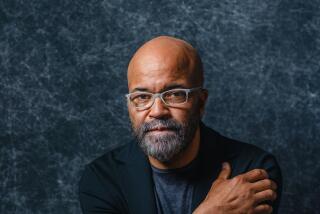Fears Spill Over the Dam in ‘The Weir’
- Share via
NEW YORK — “This is a good little story,” says the rural Irish barkeep regarding a tale about to be spun for the benefit of the pretty but guarded visitor from Dublin.
It’s about fairy spirits, knocks at the window, restless residents of a world sharing the one we know. All part of the local folklore, reassures one of the pub’s regulars--the kind of thing the German tourists lap up, along with the Guinness.
The story does the trick. In its modest but crafty fashion, so does Conor McPherson’s “The Weir,” which opened Thursday night at the Walter Kerr Theatre.
It has arrived from Dublin by way of London, where the 27-year-old Irish playwright’s stories of ghosts recently won this year’s Olivier Award for best new play. It’s a far cry from last year’s Olivier Award winner, “Closer,” likewise now on Broadway. Hell is other people, “Closer” insists, in between random couplings, often because of them. Even with its cold-creeps atmosphere, “The Weir” is vastly more reassuring. Give voice to your worst fears, McPherson seems to be saying, and you can find your way out of the darkness.
A local sport of means, Finbar (Dermot Crowley) brings his new tenant, Valerie (Michelle Fairley), around to the bar run by Brendan (Brendan Coyle). The place has two steady customers, the elder statesman Jack (Jim Norton) and Finbar’s auto repair shop employee, Jim (Kieran Ahern). For reasons unknown, Valerie seeks peace and quiet away from her life in the city.
The four men put on the best show they can, which is to say, they talk the best game they know. Jack tells the first tale, about a fairy road and a house--the one Valerie’s living in--built on its path. Finbar tops it with a story about a ghost brought about by a Ouija board, and how hearing that story led to his smoking his last cigarette.
Then McPherson ups the stakes. Jim speaks of a grave-digging job he did 20 years ago, and an encounter with a venal “pervert” from beyond. Almost against her will, Valerie then tells her own ghost story, about the loss of her daughter and the fearful child’s apparent, despairing attempt at contact by telephone.
“It might have been a wrong number,” says Jim, in a perplexing attempt to comfort her.
A weir is a dam, and without getting too heavy about it, McPherson sets up a series of metaphorical dams, over which spill the characters’ backed-up memories. They’re not all supernatural; the climactic monologue belongs to merry old Jack, and it’s a simple, sad reminiscence of romantic regret, a love that slipped away.
Ghost stories prey on our worst nightmares by design, yet there’s something a little suspect in playwright McPherson’s “serious” scary stories here. (The key tales involve the terrorization of children; both would be right at home on an episode of “Millennium” or “The X-Files.”) They’re effective on a gut level; they’re also a handy means of giving a disarmingly leisurely work some ballast. The whole play is a bit of a dodge, anyhow, in that you’re set up for things to somehow escalate on stage. They implode instead, when the folksy scares give way to stories of grievous personal loss.
Yet it’s a clever tactic. McPherson’s a sucker for the beyond, and he puts intimations thereof to better use here than in his monologue “St. Nicholas”--seen at off-Broadway’s Primary Stages last season--about a power-mongering, self-loathing drama critic getting mixed up with vampires. (I guess that one just hit too close to home.)
An earlier McPherson collection of solos, “This Lime Tree Bower,” opens next month at off-Broadway’s Primary Stages. There, no ghosts, no supernatural encounters. The monologues read like punk Brian Friel--highly energetic, lots of drinking, puking, shagging, drinking and puking. Only the general alcohol intake links them to the deceptively cozy world of “The Weir.”
Director Ian Rickson’s staging is excellent--fully, easefully inhabited by the London West End cast. Coyle’s taciturn barkeep comes in first among equals, his inflections adding just the right undercurrent of suspense. (In his case, the suspense has everything to do with the presence of Fairley’s grave but vital Valerie.) Everything’s dwarfed by the drab olive-gray walls of scenic designer Rae Smith’s grubby little pub.
Perhaps Broadway has encouraged the actors to stretch out. Director Rickson allows his ingratiating ensemble to get away with a wee bit of murder: The pacing’s extremely leisurely, every exchange mined for full value, to the point where you wouldn’t mind a few more throwaway moments. In between the big stories, McPherson writes his share of offhanded banter; why not treat it as such? Besides, the text can’t support much in the way of Meaning. The stories in “The Weir” should sneak up on us. McPherson’s barkeep is right. It’s a good little tale.
* “The Weir,” Walter Kerr Theatre, 219 W. 48th St., New York. Telecharge: (212) 239-6200.
More to Read
The biggest entertainment stories
Get our big stories about Hollywood, film, television, music, arts, culture and more right in your inbox as soon as they publish.
You may occasionally receive promotional content from the Los Angeles Times.










